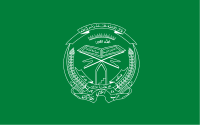Hezbi Islami د افغانستان اسلامي حزب | |
|---|---|
 | |
| Leader | Juma Khan Hamdard |
| Founder | Gulbuddin Hekmatyar |
| Founded | 1976 |
| Dissolved | 1979 |
| Preceded by | Muslim Youth |
| Succeeded by | HIG HIK HIKF |
| Ideology | Islamism |
| Party flag | |
 | |
Hezb-e-Islami (also Hezb-e Islami, Hezb-i-Islami, Hezbi-Islami, Hezbi Islami), lit. Islamic Party,[1] was an Islamist organization that was commonly known for fighting the Communist Government of Afghanistan and their close ally the Soviet Union.[citation needed] Founded and led by Gulbuddin Hekmatyar, it was established in Afghanistan in 1976.[citation needed]
It grew out of the Muslim Youth organization, an Islamist organization founded in Kabul by students and teachers at Kabul University in 1969 to combat communism in Afghanistan.[2] Its membership was drawn from ethnic Pashtuns, and its ideology from the Muslim Brotherhood and Abul Ala Maududi's Jamaat-e-Islami.[2] Another source describes it as having splintered away from Burhanuddin Rabbani's original Islamist party, Jamiat-e Islami, in 1976, after Hekmatyar found that group too moderate and willing to compromise with others.[3]
In 1979, Mulavi Younas Khalis split with Hekmatyar and established his own Hezbi Islami, known as the Khalis faction, with its power base in Nangarhar.[citation needed] Gulbuddin Hekmatyar's faction is since then referred to as the Hezb-e-Islami Gulbuddin, or HIG.
Sources
- ^ Pike, John (August 8, 1998). "Hizb-i-Islami (Islamic Party)". Intelligence Resource Program. Federation of American Scientists. Retrieved March 13, 2012.
- ^ a b Roy, Oliver; Sfeir, Antoine (2007). The Columbia World Dictionary of Islamism. Columbia University Press. p. 132.
- ^ Haqqani, Husain (2005). Pakistan: Between Mosque and Military. Carnegie Endowment. p. 173. ISBN 9780870032851. Retrieved 2 November 2014.
